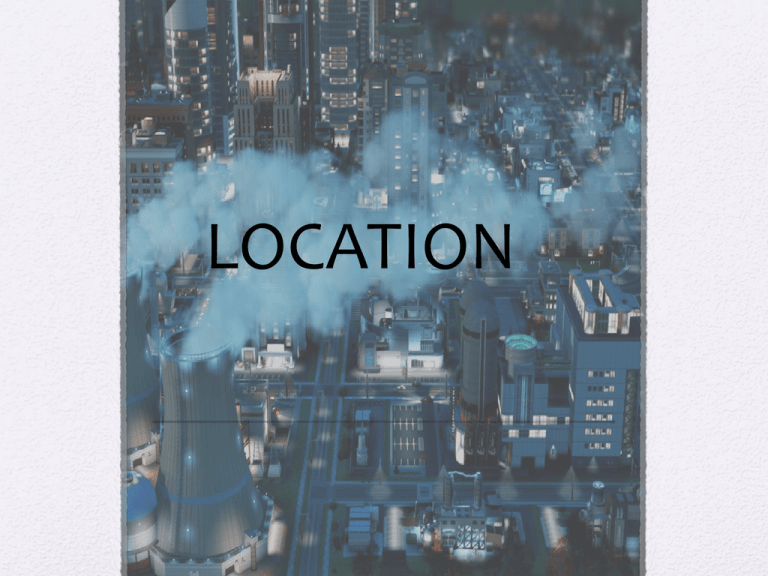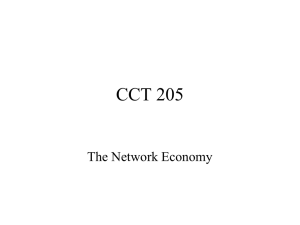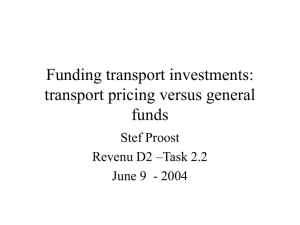Location Lesson
advertisement

LOCATION What is location? Optimal location- A business location that gives the best combination of quantitative and qualitative factors. An optimal location will have to be a compromise of one of the balances: • High fixed cost of the site with convenience for customers and potential sales revenue • Low cost of a remote site with limited supply of quality labour • Opportunities of receiving government grants in areas of high unemployment with the risks of low sales as average incomes in the area may be low. Factors influencing Location decisions: Quantitative factors- These are measurable in financial term and will have a direct impact on either the costs of a site or the revenues from it and its profitability. • Labour costs- Locational factor depends on whether the business is capital or labour intensive. An insurance company call centre will need many staff, but the labour costs of a nuclear power station will be a very small proportion to its total costs. • Transport costs- Applies to business that use heavy and bulky raw materials such as steel making will cause high transport costs if suppliers are at a great distance from the steel plant. • Sales revenue potential - The level of sales made by a business depends directly on location. Certain locations can add status and image to a new business and also allows value to be added to the product through the customers view. For example high-class retailers situated in London's Bond street. • Government Grants - Government across the world are keen on attracting new business to locate their country. Grants are offered to act as an incentive. Techniques to assist in location decision: 1. Profit Estimates- By comparing the estimated revenues and costs of each location the site with the highest annual potential profit may be identified. 2.Investment appraisal- Location decisions often involve a substantial capital investment. Investment appraisal methods can be used to identify locations with the highest potential returns over a number of years. 3.Break even analysis- A straight forward method of comparing two or more possible locations. The lower the break-even level of output the better the site is, other things being equal. Qualitative factors- these are non-measurable factors that may influence business decisions. • Safety-To avoid potential risk to the public and damage to the company's reputation as a consequence of an accident that risked public safety. • Room for further expansion-In small businesses, managers personal preferences regarding desirable work and home environment could influence location decisions of the business. • Labour supply- Apart from the cost of Labour, the availability of workers with appropriate skills will be an important factor for business location decisions. Environmental concerns- A business might be reluctant to set up in an area particularly sensitive form an environmental viewpoint which could lead to poor PR and actions from pressure groups. Infrastructure- The quality of local infrastructure, especially transport and communication links, will influence the choice of location. Other location Issues Pull of the market- The transport and communication industries have developed rapidly and the world has become a single market for so many goods. The internet can achieve a massive amount in terms of rendering location of a retailing business making it less important. Example: The cinema used to be the centerpiece of town but is now found regenerated on the ring roads. External Economies of scale These are cost reductions that cam benefit business as the industry ‘clusters’ and grows in one region. It is common for firms in the same industry to be clustered in the same region. This makes it easier to arrange co-operation and joint ventures when the businesses are located closely to each other and attract a qualified pool of labour to this area. Advantages Greater convenience for consumers Lower Transport costs Cost advantages of multi-sites in different countries Helps to develop staff skills and improve motivation Disadvantages Co-ordination problems between the locations Potential lack of control and direction from senior management based at the head office Different cultural standards and legal systems in different countries If sites are too close to each other, there may be a danger of cannibalism where one business takes sales away from another. Masdar city is a project in Abu Dhabi, in the UEA. Its core is a pLanned city being built by the Abu Dhabi Future Energy Company. The city will rely entirely on solar energy and other renewable energy sources with a sustainable zero-carbon, zero-waste ecology and will be a car free city. The city is designed to be become a hub for clean tech companies. http://www.youtube.com/watch?v=FyghLnbp20U In your city you need to locate the following places: • McDonalds • Cement factory • Mall • Residential area • School Activity 34.6











